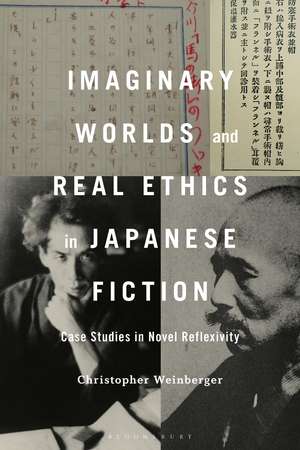Imaginary Worlds and Real Ethics in Japanese Fiction: Case Studies in Novel Reflexivity
Autor Professor or Dr. Christopher Weinbergeren Limba Engleză Hardback – 7 feb 2024
Preț: 539.49 lei
Preț vechi: 773.49 lei
-30% Nou
Puncte Express: 809
Preț estimativ în valută:
103.25€ • 106.66$ • 85.93£
103.25€ • 106.66$ • 85.93£
Carte tipărită la comandă
Livrare economică 25 martie-08 aprilie
Preluare comenzi: 021 569.72.76
Specificații
ISBN-13: 9798765105382
Pagini: 248
Dimensiuni: 152 x 229 mm
Greutate: 0.49 kg
Editura: Bloomsbury Publishing
Colecția Bloomsbury Academic
Locul publicării:New York, United States
Pagini: 248
Dimensiuni: 152 x 229 mm
Greutate: 0.49 kg
Editura: Bloomsbury Publishing
Colecția Bloomsbury Academic
Locul publicării:New York, United States
Caracteristici
Contextualizes and explains the contemporary return of metafiction to address ethical issues, providing innovative answers to questions about the value of reading fiction
Notă biografică
Christopher Weinberger is Associate Professor of Comparative World Literature and founder and Program Coordinator of Video Game Studies at San Francisco State University, USA. He teaches narrative and literary theories in Japanese and Anglophone traditions and has contributed to Novel and Fault Lines of Modernity (Bloomsbury, 2018), among other publications. He is currently writing for the forthcoming Oxford Handbook of Global Realisms.
Cuprins
AcknowledgmentsNote on TranslationIntroduction- Case Studies 1. Critical Contexts: Modern Japanese Theories of the Novel- Critical Contrasts: Ogai and Akutagawa- Ethics, Aesthetics, and Self-Consciousness in Mid-Meiji Theories of the Novel2. A Framed Narrator: Ironic Perspective in The Dancing Girl- A Man of Letters- Ogai's Dialectic Vision: Ethical Self-Overcoming in Critical and Novel Discourse- Reflexive Narration in The Dancing Girl3. Who is Ogai Gyoshi?: Authorial Desire and Ethical Self-Reflection in the Aughts- The Self-Remaking of Ogai in the Aughts- Who Is Ogai Gyoshi?: Fictions of Authorial Selfhood- Vita Sexualis and the Ethics of Self-Reflection- A Monologic Dialogism: Reflexive Critique as Ethical Posture4. Triangulating an Ethos: Ethical Criticism, Novel Alterity, and Mori Ogai's "Stereoscopic Vision"- The Culmination of an Ethics of Self-Consciousness- The Wild Goose's Formal Ethics: Complicities of Novel Perspective- A Colonizing Imagination: Suezo as Reader- Ogai's Ethical Aesthetics5. Akutagawa's Affective Ethics- An Ethics beyond Understanding- From the "If" of Reason to the "As If" of Stories: The Novel Ethics of "Rashomon"- An Affective Ethics6. The "Real" Tears of Fictional Readers: Akutagawa's "Green Onions"- The Unreal Ethics of Mimetic Worlds- Lyrical and Narrative Ethics- "Real" Readers and Fictional Emotions- Real Effects of Fictional Affect7. A Novel Theory of Literary Affect- An Art of Aporia- Storied Failures: Critical Orthodoxy on Akutagawa's Late Fiction- A Novel Theory of Literary Affect: Akutagawa's Late Writing on Shosetsu8. Haunting Failures: The Transmission of Alterity in Akutagawa's Late Writing- A Haunted Life within Literature- A Fool's Life-within-Literature- The Author as Icarus- A-Sensei and the Transmission of Affect- The Haunting Alterity of Akutagawa's Final Shosetsu9. Imaginary Worlds and Real Ethics: The Case of Murakami Haruki- The Immanent Ethics of Murakami- Murakami Criticism and the Fantasy of Realism- Alterity and Oscillation in New Ethical Theories of the Novel- Fractal Realism and the Ethics of Transpositioning- Into Wonderland: Models of Reading- Out of Wonderland: Modes of Reading- The Fantasy of Realism NotesBibliographyIndex
